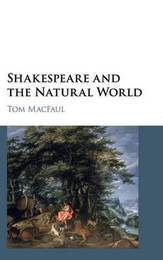
|
Shakespeare and the Natural World
Hardback
Main Details
Description
Exploring the rich range of meanings that Shakespeare finds in the natural world, this book fuses ecocritical approaches to Renaissance literature with recent thinking about the significance of religion in Shakespeare's plays. MacFaul offers a clear introduction to some of the key problems in Renaissance natural philosophy and their relationship to Reformation theology, with individual chapters focusing on the role of animals in Shakespeare's universe, the representation of rural life, and the way in which humans' consumption of natural materials transforms their destinies. These discussions enable powerful new readings of Shakespeare's plays, including A Midsummer Night's Dream, As You Like It, King Lear, Macbeth, The Tempest, The Winter's Tale, and the history plays. Proposing that Shakespeare's representation of the relationship between man and nature anticipated that of the Romantics, this volume will interest scholars of Shakespeare studies, Renaissance drama and literature, and ecocritical studies of Shakespeare.
Author Biography
Tom MacFaul is Lecturer in English at St Edmund Hall, University of Oxford. He is the author of many books and articles, including Problem Fathers in Shakespeare and Renaissance Drama (Cambridge, 2012), Poetry and Paternity in Renaissance England (Cambridge, 2010) and Male Friendship in Shakespeare and his Contemporaries (Cambridge, 2007).
Reviews'[The book] usefully points the way for further fruitful labour at the intersection of ecocritical and religious discourse. The incisiveness of its close readings guarantees that Shakespeareans, and scholars of early modern literature more generally, have much to enjoy here.' Daniel Cattell, The Seventeenth Century
|